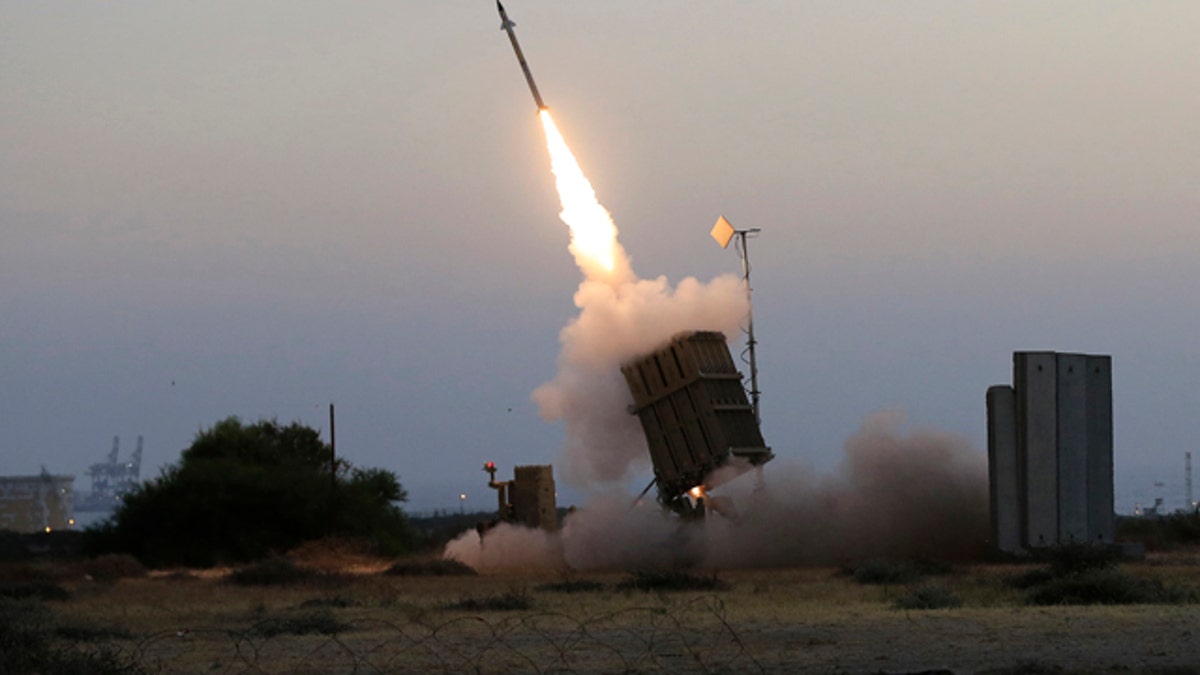
July 5, 2014: An Iron Dome air defense system fires to intercept a rocket from Gaza Strip in the costal city of Ashkelon, Israel. (AP Photo/Tsafrir Abayov)
Imagine that wherever you live in the United States you have only 15 seconds to reach a secure place to avoid a rocket or missile. Seriously, count down from 15 to 1, and think about what you would do. For more than 3.5 million Israelis, Jews and Arabs, their mental stopwatch is ticking as Hamas extends the reach of its barrage from Israeli communities near the Gaza border to Hadera, 26 miles north of Tel Aviv.
Some of the hundred-per-day rockets have been stopped by Israel’s Iron Dome anti-missile system. Most have landed in open fields or in buildings that, by chance, were empty. But given past experience with Hamas, the deadly projectiles are likely to soon maim or kill.
[pullquote]
A few years ago, I visited Sderot, the Israeli town that has borne the brunt of Hamas rockets for years. I stood next to a crater in a kindergarten playground where a Qassam rocket had landed the previous Saturday. Since that was the Jewish Sabbath, the 50-plus children were not on site. Then, as now, it has largely been good fortune that Hamas has failed to inflict mass casualties, but they have vowed to not give up.
The current Hamas offensive began shortly after Palestinian Authority President Mahmoud Abbas refused to extend peace talks with Israel, and instead formed a unity government with the unrepentant terrorist organization on June 2. The frequency and reach of rockets fired into Israel increased after three Israeli teens, abducted and murdered by Hamas, were found on June 30. Hamas leaders, who earlier had encouraged the kidnapping of Israelis, now both celebrated and denied responsibility for the abduction.
One twisted narrative, reported as fact by some Western media, is that Hamas was “provoked” by Israeli actions aimed at bringing to justice the individuals responsible for killing the teens. But that myopic view belies the very essence of Hamas, which is intent on using all kinds of violence to fulfill its mission of destroying the State of Israel. While it does not have the capacity to overwhelm the IDF, Hamas can certainly wreak havoc, and right now is doing its best to provoke a wider conflict.
It did not have to be this way. In 2005, Gaza was liberated as Israel withdrew totally and transferred the territory to the Palestinian Authority, as a first step towards the potential achievement of a two-state solution. But Hamas never shared that vision of peace, and immediately after seizing control of Gaza in 2007, returned to its terrorist raison d’etre. Instead of finding ways to build constructively in Gaza, Hamas focused on acquiring and manufacturing rockets. Today, this remains Gaza’s primary export, and the rockets are arriving uninvited in Israel at a fast and furious pace.
For those not blinded by unmitigated hope, it is clear that Hamas never changed one bit. And so it was disappointing that the White House and State Department, followed by our European allies, so quickly welcomed formation of the Palestinian unity government, instinctively accepting the Palestinian narrative that this Fatah-Hamas marriage, blessed by President Abbas, would be the panacea to advance the peace process.
Tragically, the international community has long ignored the evil festering in Hamas-ruled Gaza. Indeed, Gaza was barely mentioned during Secretary of State John Kerry’s nine-month effort to achieve a negotiated two-state settlement. That hopeful effort was buried when Abbas rebuffed Kerry’s last-minute attempt to extend the talks that summarily ended in April. Abbas has not been held accountable for joining up with Hamas, nor has any government that recognized the marriage pressed him to declare a divorce.
Hope is not policy. Amidst the escalating conflict, Israeli Prime Minister Netanyahu is wondering whom he can trust as he carefully considers options to protect all of Israel’s citizens.
Will the international community get off the fence and unequivocally condemn Hamas’s relentless attacks on Israel? Will there be worldwide expressions of full solidarity with Israelis – men, women and children – forced to endure the ceaseless, frequent assaults?
And, most importantly, when Israel does take further actions, will world leaders ask themselves what they would do if their own countries were similarly threatened and attacked, and their citizens had only 15 seconds to find shelter?
